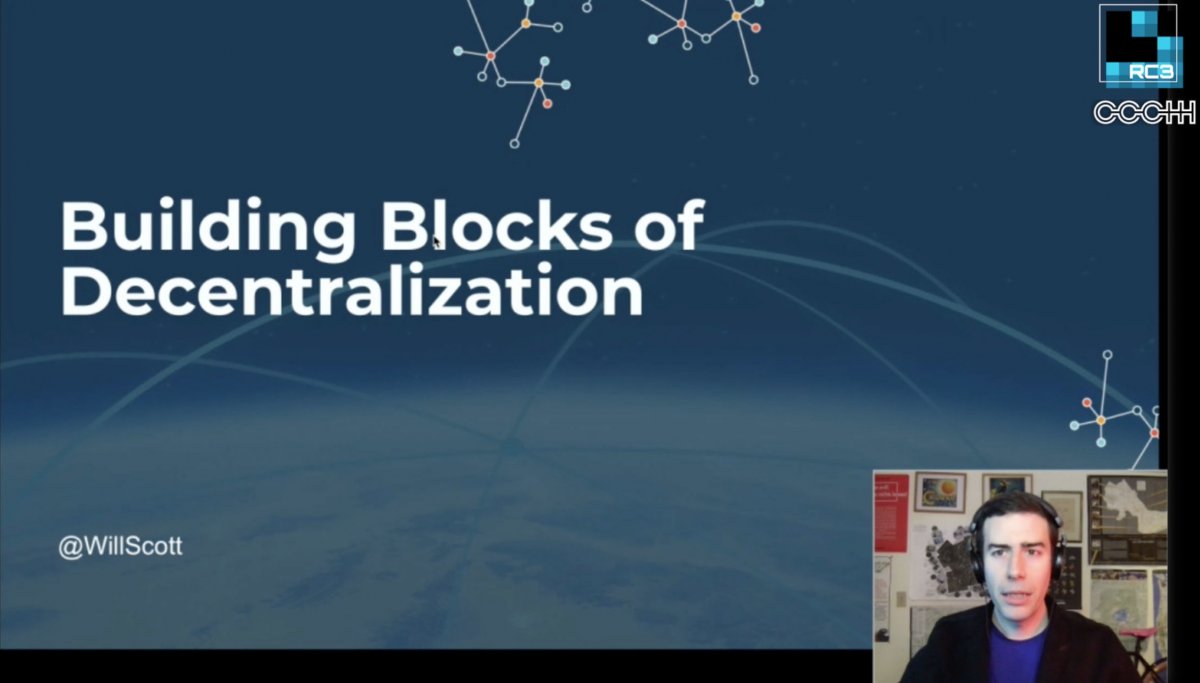rC3: Mastodon, Matrix & Co. – Building blocks and hurdles for decentralized online systems
Source: Heise.de added 30th Dec 2020Internet users spend a lot of time in the central silos of Google, Amazon, Facebook, Apple and Microsoft. The US giants benefit from network effects that are driving more and more users to the platforms. A wide range of technical initiatives have set themselves the goal of combating the resulting monopoly structures in online services and building decentralized alternatives. Even proponents of such projects admit that most of them are still emulating the central figures: they have to catch up or develop their own killer apps.
Far from a breakthrough Web hacker Will Scott gave an overview of the current state of affairs at the remote Chaos Communication Congress (rC3). According to him, 2020 have both federated communication networks like the messenger service Matrix and decentralized platforms like the social network Secure Scuttlebutt (SBB) , the InterPlanetary File System (IFPS) and – in a broader sense – cryptocurrencies have become more widespread. But most of them are still far from a breakthrough and are confronted with many big questions about growth options.
BitTorrent is one of the experts in censorship-resistant web Applications with three to four million users a day to one of the largest decentralized entities. The peer-to-peer network (P2P) offers around 2.5 million active torrents. In order to keep an eye on these and to download them in a resource-saving manner, there are around 400 special open tracker applications. There are distributed hash tables (DHT) with over four million torrents for searching.
Good year for Twitter alternatives (Image: rC3 media.ccc.de, CC BY 4.0)
Mastodon also had a “good year” according to Scott. The Twitter alternative now contributes around three million active users and about 5000 busy servers to the social media world “Fediverse”. 70. 000 Members regularly post content themselves, the rest is limited to reading along. The number of Matrix users was said to have risen to 2.5 million at the same time, which the server on 2500. The significant increase is due, among other things, to the fact that the Bundeswehr and parts of the German education system had decided to switch to the open communication protocol. In addition, Matrix is also subsidized by the government in France.
IPFS, which works similarly to BitTorrent, has exceeded two million users, of whom 20 Percent operated their own desktop nodes, said the computer scientist happily. It includes a total of 5000 guaranteed DHT nodes and around eight million daily CIDs (Content Identifiers) for recognizing content. Planetary.social has also expanded a special SBB protocol to the mobile Internet. The self-hosted, mesh-networked social media system SBB itself comes to around 10. Members, several hundred of whom posted content and pushed the underlying P2P protocol .
Bitcoin has around one million active accounts and 11 . “Full Nodes”, which generated new blocks for the production of the digital coins, performed Scott. There is a big gap between users and servers here. This is due to the fact that a complete node alone requires around 70 gigabytes for the blockchain. Basically, the scientist also counted about six million SMTP and good 500. 000 WordPress server and 20 Millions of Jitsi users to the decentralized network.
Problems of growth While some of the offers still require a critical mass of users, the more successful of them are already suffering from growing pains. The goal of federated network services was to externalize and better balance the heterogeneity of resources between clients and servers, explained Scott. Some of the connected instances have more storage space and are more available. How much all members benefit from it depends heavily on the heuristics used and the algorithms created with them.
The different models
(Image: rC3 media.ccc.de, CC BY 4.0)
In mesh networks, messages and content often spread like rumors, which required additional synchronization efforts, clarified the hacker. Often there is no catchy concept for the structure of the network, so that its properties are also difficult to implement. DHT, on the other hand, grow massively quickly with the number of users who bring data and resources with them, so they scale poorly and, in abstract form, can be compared with a central database. The achievability of the goal of getting content as close as possible to the location of one’s own computer again depends on the quality of the algorithms.
According to Scott, broken nodes also lead to crashes and delays. There must therefore be incentives not to do anything “bad” in the network. However, this approach also leads to more centralization, since individual units that acted in an exemplary manner received more power. If you wanted to identify individual users, this could be done via an external authority. However, this raises data protection problems. Even now, metadata such as IP addresses are not protected by some decentralized service providers. Advanced encryption and at least pseudonymization solutions are required here.
Decentralization against the power of the great The researcher identified bandwidth as a further problem, especially for P2P networks: uploads are still designed for only half the capacity of downloads on most Internet connections. The latency between neighboring nodes is comparatively low, but connections between end users are usually not well developed. For Scott there is still no doubt: “We need decentralization, otherwise the power of the big ones will increase.”
(mho)
brands: 11 Amazon Apple Google Matrix Microsoft Million Mobile New other Space media: Heise.de keywords: Amazon Apple Bitcoin Facebook Google Internet Mobile Server
Related posts
Notice: Undefined variable: all_related in /var/www/vhosts/rondea.com/httpdocs/wp-content/themes/rondea-2-0/single-article.php on line 88
Notice: Undefined variable: all_related in /var/www/vhosts/rondea.com/httpdocs/wp-content/themes/rondea-2-0/single-article.php on line 88
Related Products
Notice: Undefined variable: all_related in /var/www/vhosts/rondea.com/httpdocs/wp-content/themes/rondea-2-0/single-article.php on line 91
Warning: Invalid argument supplied for foreach() in /var/www/vhosts/rondea.com/httpdocs/wp-content/themes/rondea-2-0/single-article.php on line 91
